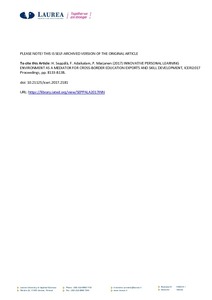Innovative Personal Learning Environment as a Mediator for Cross-Border Education Exports and Skills Development
Seppälä, Heikki; Adaikalam, Francis; Marjanen, Päivi (2017)
Seppälä, Heikki
Adaikalam, Francis
Marjanen, Päivi
International Academy of Technology, Education and Development
2017
Julkaisun pysyvä osoite on
https://urn.fi/URN:NBN:fi:amk-201801171386
https://urn.fi/URN:NBN:fi:amk-201801171386
Tiivistelmä
The focus of this paper is on educational collaboration between India and Finland and how the use of educational technology could help in establishing mutually beneficial relationships. This study is carried out under the Eurostars/Tekes funding scheme, in a project called TRIBA and in collaboration with a Personal Learning Environment (PLE) company called Claned. A Personal learning environment helps learners to take control and manage their own learning. PLEs support learners to set learning goals, manage and process learning content, and communicate with other learners (Litmanen & Autio 2016). The goal is to achieve fruitful collaboration between organisations, content providers and educators that recognises the individual needs of learners and at the same time recognize the requirements from working life.
Formal education is typically based on traditional classroom teaching, fixed deadlines, assessment tasks and criteria defined by teachers. The trend is moving away from traditional education towards self-directed learning and the inclusion of technologies in ways that meet their needs and preferences (Prensky 2005). It is noted that many of the students graduating from formal education lack the skills required by the working life. Recent studies showed that on an average, only 42% of employers felt that new hires were ready for work. In India almost 83% of educational institutions believe that their graduates are ready for the market, but only 51% of employers agree with that. (Mourshed, Farrell & Barton 2015; Raina 2015.) Alternative ways for educating people with relevant skills is required. Currently there are plenty of online learning possibilities where to choose from which MOOCs are the most popular. The “education for masses” works some of the time but the approach does not come without pitfalls. A recent review of MOOCs (Hew & Cheung 2015) found out that nearly 90 % of students starting a course drop out due to lack of motivation or engagement, having insufficient prior knowledge about the topic or experiencing the assignments and materials as ambiguous.
Technological advancements in countries like India has posed both opportunities and challenges. In a complex social and cultural environment, learning and its outcome is not asymmetrical. Some are fully exposed from younger days whereas others have limited or no exposure to such online tools. Moreover online platforms have either not developed fully or they are non existent in many languages. Hence, these structural barriers and social realities will have a long lasting impact on the usability of such platforms. In this paper we present a case where we examine the possibilities for PLE to act as a facilitator for bidirectional education exports between Finland and India, with emphasis in sectors that are identified as country specific expertise areas with high growth potential.
Formal education is typically based on traditional classroom teaching, fixed deadlines, assessment tasks and criteria defined by teachers. The trend is moving away from traditional education towards self-directed learning and the inclusion of technologies in ways that meet their needs and preferences (Prensky 2005). It is noted that many of the students graduating from formal education lack the skills required by the working life. Recent studies showed that on an average, only 42% of employers felt that new hires were ready for work. In India almost 83% of educational institutions believe that their graduates are ready for the market, but only 51% of employers agree with that. (Mourshed, Farrell & Barton 2015; Raina 2015.) Alternative ways for educating people with relevant skills is required. Currently there are plenty of online learning possibilities where to choose from which MOOCs are the most popular. The “education for masses” works some of the time but the approach does not come without pitfalls. A recent review of MOOCs (Hew & Cheung 2015) found out that nearly 90 % of students starting a course drop out due to lack of motivation or engagement, having insufficient prior knowledge about the topic or experiencing the assignments and materials as ambiguous.
Technological advancements in countries like India has posed both opportunities and challenges. In a complex social and cultural environment, learning and its outcome is not asymmetrical. Some are fully exposed from younger days whereas others have limited or no exposure to such online tools. Moreover online platforms have either not developed fully or they are non existent in many languages. Hence, these structural barriers and social realities will have a long lasting impact on the usability of such platforms. In this paper we present a case where we examine the possibilities for PLE to act as a facilitator for bidirectional education exports between Finland and India, with emphasis in sectors that are identified as country specific expertise areas with high growth potential.
